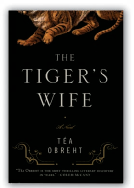 When Obreht was twelve, she and her mother settled in a suburb of Atlanta. It was by far the biggest culture shock she had experienced. "I went from a private school in Cairo with about sixty other kids who were of mixed backgrounds—Dutch, Arab, Syrian, from all over the place," she recalls. "And then I got to Georgia and my school had 1,200 kids." Obreht was always the youngest in her class, having skipped two grades; a few years after the family's next move (to Palo Alto), she enrolled in the University of Southern California as a sixteen-year-old freshman double majoring in creative writing and art history. "My mother was always extremely supportive of the whole writing gig," Obreht says. "Her one caveat was, 'You can go to college for creative writing, but you must have some sort of vocational degree when you come out.' So junior year, I decided that that would be art history." She rolls her eyes and says with more than a hint of good-natured sarcasm, "Because you can do a lot with a BA in art history."
When Obreht was twelve, she and her mother settled in a suburb of Atlanta. It was by far the biggest culture shock she had experienced. "I went from a private school in Cairo with about sixty other kids who were of mixed backgrounds—Dutch, Arab, Syrian, from all over the place," she recalls. "And then I got to Georgia and my school had 1,200 kids." Obreht was always the youngest in her class, having skipped two grades; a few years after the family's next move (to Palo Alto), she enrolled in the University of Southern California as a sixteen-year-old freshman double majoring in creative writing and art history. "My mother was always extremely supportive of the whole writing gig," Obreht says. "Her one caveat was, 'You can go to college for creative writing, but you must have some sort of vocational degree when you come out.' So junior year, I decided that that would be art history." She rolls her eyes and says with more than a hint of good-natured sarcasm, "Because you can do a lot with a BA in art history."
During her four years at USC, writing took a backseat to the small ballroom dance troupe that she founded—until she heard about a last-minute opening in professor and novelist T. C. Boyle's advanced fiction workshop. "It was like thunder from the sky," she recalls, "a sign from on high." Obreht had read Descent of Man, Boyle's collection of short stories, and it had reawakened her interest in fiction. From that point on, writing consumed her; when she was accepted into Cornell's highly selective MFA program, she moved (yet again) to Ithaca.
Three days before Obreht's college graduation, her grandfather, one of the most influential people in her life, died of colon cancer. The loss hit her hard—and inspired her to begin the story that would become The Tiger's Wife a few months later, during her first semester at Cornell. Many of the rituals enjoyed by Natalia and her grandfather in the novel were taken directly from Obreht's real-life relationship. The novel opens with such a scene, with Natalia recounting an episode from her childhood:
In my earliest memory, my grandfather is bald as a stone and he takes me to see the tigers. He puts on his hat, his big-buttoned raincoat, and I wear my lacquered shoes and velvet dress. It is autumn, and I am four years old. . . . The cages face a courtyard, and we go down the stairs and walk slowly from cage to cage. There is a panther, too, ghost spots paling his oil-slick coat; a sleepy, bloated lion from Africa. But the tigers are awake and livid, bright with rancor. Stripe-lashed shoulders rolling, they flank one another up and down the narrow causeway of rock, and the smell of them is sour and warm and fills everything.
"Yes," Obreht says before the question is even posed, "my grandfather and I did go to the zoo together and look at the tigers." Before he died, her grandfather, confident in her career path, asked her to write under his name, Obreht.
After completing her MFA, Obreht stayed at Cornell to teach a freshman writing seminar and a creative writing class, and spent her spare time expanding her short story into a novel. Meanwhile, she had begun to re-establish contact with people she had left behind in Belgrade. The more she went back to visit, the more she began to see how greatly the war had impacted her peers. Though she had escaped much of the horror thanks to her family's timely move, many young adults in the former Yugoslavia hadn't been so lucky. "A sense of frustration still exists in people of my generation," she says. "There's a sense of powerlessness, which I think has a lot to do with the economic and social shifts that happened during the war. There was this stagnancy with respect to social mobility, what you could do with your life, how much money you could make." This frustration permeates Obreht's novel in painfully realistic detail—which is remarkable given that the author never experienced it firsthand. "It is a work of fiction," she is careful to add, "so I did make stuff up."
Sometimes such creativity came easily to Obreht, while at other moments she found it more difficult. "When writing is going poorly it's agonizing, because it's a feeling of powerlessness," she says. "You're running up against a wall that you can't quite see, you just know that it's there." While writing her novel, she found herself slipping into a schedule that involved sleeping during the day and writing at night, and she would often stave off incipient writer's block by hopping into her red Nissan Altima and taking long drives, sometimes for hours, while listening to specific kinds of music for different parts of the book. "Writer's block for me comes when you sit down and nothing happens in the first twenty minutes, or you hit dead ends, or suddenly you find yourself googling song lyrics," she says. "It's very easy to give up and get out of the chair and go do something else. The trick is to do something that will allow you to think about your writing."

Her nightly rides did the trick, and she settled into a routine involving a jug of iced tea and a certain sitcom. "Over the course of writing The Tiger's Wife I purchased all eleven seasons of 'Frasier,'" she admits. "It's such a happy show. I think it's about conditioning comfort spaces in your brain, so it's like, 'OK, I have my "Frasier," I have my iced tea, here I am, there's nothing else to do; it's nighttime, there's nobody around.' You sort of have to corner yourself."
In March 2011, nearly two years after the short story version appeared in the New Yorker, The Tiger's Wife was published by Random House to critical acclaim. A few months later, Obreht became the youngest-ever winner of Britain's $45,000 Orange Prize for female fiction writers. "The Tiger's Wife is an exceptional book and Téa Obreht is a truly exciting new talent," head judge Bettany Hughes said in the award statement. "Obreht's powers of observation and her understanding of the world are remarkable. By skillfully spinning a series of magical tales she has managed to bring the tragedy of chronic Balkan conflict thumping into our front rooms with a bittersweet vivacity." Obreht says she was shocked by the award; although she is happy with her work, she still confuses attendees of her book readings by doing some on-the-spot editing of her published writing.
Of course, the road to success hasn't been without its potholes. Obreht's rapid rise has wearied some, who feel that the overwhelming praise is premature for someone so young and with just a single novel and a few short stories to her credit. Molly Fischer of the New York Observer wrote that Obreht "writes like she's trying to please the grownups, and in so doing produces the good student's notion of what constitutes a good book. The Tiger's Wife reads like it belongs in the running for a Newberry rather than a Pulitzer." In the Telegraph, Philip Hensher began his review by noting that the Orange Prize "has a slightly shaky track record in picking first-rate books." He went on to say that Obreht "has at least stretched herself in taking on so large a subject for her first novel. If she had managed to render her interesting topic with an individual and striking voice, she would have produced something lasting as well as prize-winning."
But while some hint (or, perhaps, snipe) that Obreht may be overpraised or have peaked prematurely, Lennon has no such worries; in fact, he sees her early success as oddly liberating. Why? "Because she's gotten all this adulation for the first novel," he explains, "and this much hype just can't happen again." Then he adds: "She could keep being popular, famous, and critically well-regarded—which I expect will happen."
As for Obreht herself, the whole experience still seems fabulously surreal—but she stresses that she's keeping a firm grip on herself and her voice. "A lot of writers I've met have said that at the end of the day, no matter what the pressure is from fans or critics or the publishing industry, you must be at peace with yourself," she says. "After I finished The Tiger's Wife, I felt that it was the best possible work that I could have produced at this stage in my life as a writer."
For now, Obreht is still living in Ithaca; though she is not currently teaching, she says she can see herself returning to it someday. Asked about her next novel, she is careful not to reveal much. "I don't think I'm quite done with the Balkan region just yet," she allows. "That's all I can say." And though she is content to split her time among her Commons apartment, the downtown Starbucks, and her nighttime drives, she does not anticipate staying in Ithaca—or anywhere else—for the long-term. As she puts it with another throaty laugh: "I'm a nomad."
Former CAM intern Adrienne Zable '11 is a freelance writer living in Ithaca.


